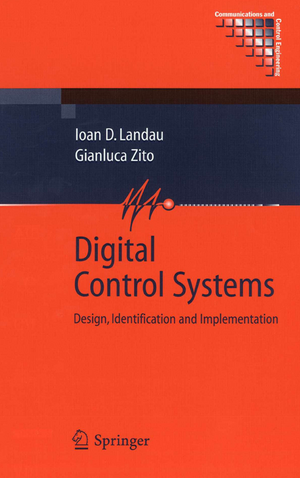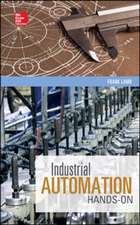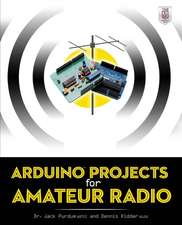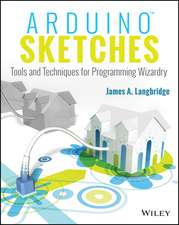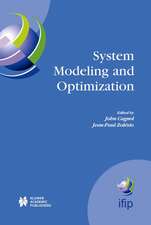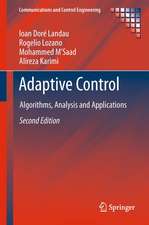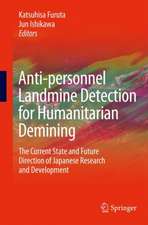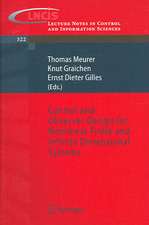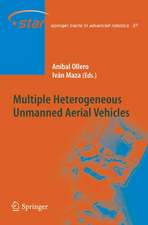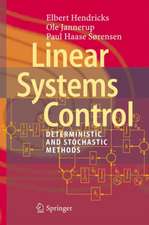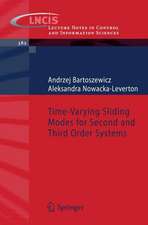Digital Control Systems: Design, Identification and Implementation: Communications and Control Engineering
Autor Ioan Doré Landau, Gianluca Zitoen Limba Engleză Hardback – 13 oct 2005
| Toate formatele și edițiile | Preț | Express |
|---|---|---|
| Paperback (1) | 594.42 lei 6-8 săpt. | |
| SPRINGER LONDON – 19 oct 2010 | 594.42 lei 6-8 săpt. | |
| Hardback (1) | 656.43 lei 6-8 săpt. | |
| SPRINGER LONDON – 13 oct 2005 | 656.43 lei 6-8 săpt. |
Din seria Communications and Control Engineering
- 15%
 Preț: 659.70 lei
Preț: 659.70 lei - 20%
 Preț: 879.74 lei
Preț: 879.74 lei - 18%
 Preț: 953.65 lei
Preț: 953.65 lei - 18%
 Preț: 1117.03 lei
Preț: 1117.03 lei - 9%
 Preț: 1385.77 lei
Preț: 1385.77 lei - 18%
 Preț: 1128.08 lei
Preț: 1128.08 lei - 18%
 Preț: 953.65 lei
Preț: 953.65 lei - 15%
 Preț: 656.89 lei
Preț: 656.89 lei - 18%
 Preț: 896.52 lei
Preț: 896.52 lei - 18%
 Preț: 1113.26 lei
Preț: 1113.26 lei - 18%
 Preț: 1388.22 lei
Preț: 1388.22 lei - 15%
 Preț: 647.27 lei
Preț: 647.27 lei - 18%
 Preț: 954.45 lei
Preț: 954.45 lei - 18%
 Preț: 1231.47 lei
Preț: 1231.47 lei - 18%
 Preț: 948.92 lei
Preț: 948.92 lei - 18%
 Preț: 1232.57 lei
Preț: 1232.57 lei - 18%
 Preț: 1127.28 lei
Preț: 1127.28 lei - 15%
 Preț: 643.34 lei
Preț: 643.34 lei - 18%
 Preț: 1401.30 lei
Preț: 1401.30 lei - 15%
 Preț: 651.51 lei
Preț: 651.51 lei - 20%
 Preț: 1454.07 lei
Preț: 1454.07 lei - 18%
 Preț: 948.79 lei
Preț: 948.79 lei - 18%
 Preț: 1233.06 lei
Preț: 1233.06 lei - 18%
 Preț: 947.85 lei
Preț: 947.85 lei - 18%
 Preț: 950.96 lei
Preț: 950.96 lei - 18%
 Preț: 956.99 lei
Preț: 956.99 lei - 15%
 Preț: 644.18 lei
Preț: 644.18 lei - 18%
 Preț: 946.87 lei
Preț: 946.87 lei - 18%
 Preț: 951.14 lei
Preț: 951.14 lei - 18%
 Preț: 961.55 lei
Preț: 961.55 lei - 15%
 Preț: 644.18 lei
Preț: 644.18 lei - 20%
 Preț: 990.80 lei
Preț: 990.80 lei - 18%
 Preț: 1006.72 lei
Preț: 1006.72 lei - 18%
 Preț: 942.44 lei
Preț: 942.44 lei - 18%
 Preț: 1233.06 lei
Preț: 1233.06 lei - 15%
 Preț: 641.85 lei
Preț: 641.85 lei - 18%
 Preț: 957.75 lei
Preț: 957.75 lei - 15%
 Preț: 649.87 lei
Preț: 649.87 lei - 18%
 Preț: 958.07 lei
Preț: 958.07 lei - 18%
 Preț: 1117.99 lei
Preț: 1117.99 lei - 18%
 Preț: 1395.94 lei
Preț: 1395.94 lei - 18%
 Preț: 781.62 lei
Preț: 781.62 lei - 18%
 Preț: 953.20 lei
Preț: 953.20 lei - 18%
 Preț: 1109.78 lei
Preț: 1109.78 lei
Preț: 656.43 lei
Preț vechi: 772.26 lei
-15% Nou
Puncte Express: 985
Preț estimativ în valută:
125.65€ • 136.53$ • 105.61£
125.65€ • 136.53$ • 105.61£
Carte tipărită la comandă
Livrare economică 21 aprilie-05 mai
Preluare comenzi: 021 569.72.76
Specificații
ISBN-13: 9781846280559
ISBN-10: 1846280559
Pagini: 512
Ilustrații: XXIV, 484 p. 238 illus. With online files/update.
Dimensiuni: 155 x 235 x 35 mm
Greutate: 0.86 kg
Ediția:2006
Editura: SPRINGER LONDON
Colecția Springer
Seria Communications and Control Engineering
Locul publicării:London, United Kingdom
ISBN-10: 1846280559
Pagini: 512
Ilustrații: XXIV, 484 p. 238 illus. With online files/update.
Dimensiuni: 155 x 235 x 35 mm
Greutate: 0.86 kg
Ediția:2006
Editura: SPRINGER LONDON
Colecția Springer
Seria Communications and Control Engineering
Locul publicării:London, United Kingdom
Public țintă
ResearchCuprins
Continuous Control Systems: A Review.- Computer Control Systems.- Robust Digital Controller Design Methods.- Design of Digital Controllers in the Presence of Random Disturbances.- System Identification: The Bases.- System Identification Methods.- Practical Aspects of System Identification.- Practical Aspects of Digital Control.- Identification in Closed Loop.- Reduction of Controller Complexity.
Notă biografică
Ioan Doré Landau is Research Director (Emeritus) at C.N.R.S.(National Centre for Scientific Research) and works at the Laboratoire d'Automatique de Grenoble (CNRS/INPG) of the Institut National Polytechnique de Grenoble.
His research interests encompass theory and applications in system identification, adaptive control, robust digital control and nonlinear systems. He has authored and co-authored over 200 papers on these subjects. He is the author of the books: Adaptive Control: The Model Reference Appoach (Dekker 1979) and translated into Chinese, System Identification and Control Design (Hermès 1993, Prentice Hall 1990). and co-author of the books (with M. Tomizuka) Adaptive Control: Theory and Practice (in Japanese - Ohm 1981) and (with R. Lozano and M. M'Saad) Adaptive Control (Springer Verlag 1997). He edited and co-edited several books in French on the above topics including a series on "Mathematical Tools for Control, System Analysis and Signal Processing and Models" and one on "Adaptive Control". He holds several patents and was at the origin of several software packages in control developed by ADAPTECH. He has advised 29 PhD students. He delivered a number of Plenary Talks at International Conferences including American Control Conference in Seattle in 1995. He was the key note speaker at the European Control Conference in Bruxelles in 1997.
Dr. Landau received the Rufus Oldenburger Medal 2000 from the American Society of Mechanical Engineering in recognition of significant contributions to the field of automatic control for his pioneering contributions in adaptive control and system identification. He was a R. Springer Professor at University of .California. (Berkeley) Department of Mechanical Engineering in 1992. He received the pris Monpetit from the French Academy of Science in 1991, the "Best Review Paper Award (1981-84)" for his paper on adaptive control published in ASME Journal of Dynamical Systems Measurement and Control, the C.N.R.S. Silver Medal in 1982 and the Great Gold Medal at the Invention Exibition Vienna in 1968 for his patent on the variable frequency control of asynchronous motors.
He received the degree of Docteur-des-Sciences Physiques from the University of Grenoble. Before joining the C.N.R.S. in 1976 as research director, he was an Associate Professor at the Institut National Polytechnique de Grenoble from 1973 to 1976, a Senior Post-doctoral Research Associate at NASA - Ames Research Center in 1971-72 and a research engineer at ALSTHOM in 1969-71 and 72-73.
At C.N.R.S. he launched several coordinated programs in the field of Control which contributed to the emergence and development of the French control community. He was the Director of the co-ordinated research programs: "Mathematical Tools and Models for Control, System Analysis and Signal Processing" from 1979 to 1982, "Adaptive Systems in Control and Signal Processing" from 1984to 1988 and "Automatique" from 1988 to 1996. He was also Director of the Laboratoire d'Automatique de Grenoble from 1987 to 1990.
Dr. Landau was the General Chairman of the first European Control Conference organised in Grenoble in 1991. He was one of the founders and the first President of the European Community Control Association (ECCA) from 1991 to 1993 (now EUCA) and he was Editor in Chief of the European Journal of Control (a publication of the European Union Control Association) from 1994 to the end of 2002.
In June 1998 the CNRS organized an international colloquium in his honor "Perspectives in Control - Theory and Applications". The proceedings of the colloqium (Normand-Cyrot, Ed., Perspectives in Control 1-85233-042-2) were published by Springer.
His research interests encompass theory and applications in system identification, adaptive control, robust digital control and nonlinear systems. He has authored and co-authored over 200 papers on these subjects. He is the author of the books: Adaptive Control: The Model Reference Appoach (Dekker 1979) and translated into Chinese, System Identification and Control Design (Hermès 1993, Prentice Hall 1990). and co-author of the books (with M. Tomizuka) Adaptive Control: Theory and Practice (in Japanese - Ohm 1981) and (with R. Lozano and M. M'Saad) Adaptive Control (Springer Verlag 1997). He edited and co-edited several books in French on the above topics including a series on "Mathematical Tools for Control, System Analysis and Signal Processing and Models" and one on "Adaptive Control". He holds several patents and was at the origin of several software packages in control developed by ADAPTECH. He has advised 29 PhD students. He delivered a number of Plenary Talks at International Conferences including American Control Conference in Seattle in 1995. He was the key note speaker at the European Control Conference in Bruxelles in 1997.
Dr. Landau received the Rufus Oldenburger Medal 2000 from the American Society of Mechanical Engineering in recognition of significant contributions to the field of automatic control for his pioneering contributions in adaptive control and system identification. He was a R. Springer Professor at University of .California. (Berkeley) Department of Mechanical Engineering in 1992. He received the pris Monpetit from the French Academy of Science in 1991, the "Best Review Paper Award (1981-84)" for his paper on adaptive control published in ASME Journal of Dynamical Systems Measurement and Control, the C.N.R.S. Silver Medal in 1982 and the Great Gold Medal at the Invention Exibition Vienna in 1968 for his patent on the variable frequency control of asynchronous motors.
He received the degree of Docteur-des-Sciences Physiques from the University of Grenoble. Before joining the C.N.R.S. in 1976 as research director, he was an Associate Professor at the Institut National Polytechnique de Grenoble from 1973 to 1976, a Senior Post-doctoral Research Associate at NASA - Ames Research Center in 1971-72 and a research engineer at ALSTHOM in 1969-71 and 72-73.
At C.N.R.S. he launched several coordinated programs in the field of Control which contributed to the emergence and development of the French control community. He was the Director of the co-ordinated research programs: "Mathematical Tools and Models for Control, System Analysis and Signal Processing" from 1979 to 1982, "Adaptive Systems in Control and Signal Processing" from 1984to 1988 and "Automatique" from 1988 to 1996. He was also Director of the Laboratoire d'Automatique de Grenoble from 1987 to 1990.
Dr. Landau was the General Chairman of the first European Control Conference organised in Grenoble in 1991. He was one of the founders and the first President of the European Community Control Association (ECCA) from 1991 to 1993 (now EUCA) and he was Editor in Chief of the European Journal of Control (a publication of the European Union Control Association) from 1994 to the end of 2002.
In June 1998 the CNRS organized an international colloquium in his honor "Perspectives in Control - Theory and Applications". The proceedings of the colloqium (Normand-Cyrot, Ed., Perspectives in Control 1-85233-042-2) were published by Springer.
Textul de pe ultima copertă
The extraordinary development of microprocessors and their extensive use in control systems in all fields of application has brought about important changes in the design of control systems. Their performance and low cost make them much more capable, in many circumstances, than analog controllers.
In order to take full advantage of this potential, Digital Control Systems demonstrates in detail how to design and implement high-performance model-based controllers combining system identification and control design techniques extensively tested in industrial milieux. The effective use of these techniques is illustrated in the context of various systems including: d.c. motors, flexible transmissions, air heaters, distillation columns and hot-dip galvanizing. Topics covered include:
• essentials of computer-based control systems;
• controller design methods (robust pole placement, long-range-predictive control, state space, digital PID, etc.);
• system identification techniques;
• practical aspects of system identification and digital control.
A number of recent methodological developments in control design and system identification, driven by applications, are presented, including:
• robust digital control design using sensitivity function shaping;
• plant identification in closed loop operation;
• reduction of controller complexity.
The text of Digital Control Systems is enhanced, for practical and tutorial purposes, by the use of software which illustrates the various concepts and algorithms and gives a feeling for the phenomena, discussed. The MATLAB®/Scilab routines used for this purpose can be downloaded from the textbook’s website where additional material for teaching is available (slide presentations of the chapter material, data files for additional laboratory sessions and example files).
Graduate students in courses on digital control will find this text to be most helpful in learning the essential techniques of computer-based control while the wealth of additional material will make the tutor’s tasks of teaching and preparation quicker and easier. The book also provides practising engineers wishing to enhance their skills in this area with efficient and co-ordinated methods for the design and implementation of computer-based controllers.
In order to take full advantage of this potential, Digital Control Systems demonstrates in detail how to design and implement high-performance model-based controllers combining system identification and control design techniques extensively tested in industrial milieux. The effective use of these techniques is illustrated in the context of various systems including: d.c. motors, flexible transmissions, air heaters, distillation columns and hot-dip galvanizing. Topics covered include:
• essentials of computer-based control systems;
• controller design methods (robust pole placement, long-range-predictive control, state space, digital PID, etc.);
• system identification techniques;
• practical aspects of system identification and digital control.
A number of recent methodological developments in control design and system identification, driven by applications, are presented, including:
• robust digital control design using sensitivity function shaping;
• plant identification in closed loop operation;
• reduction of controller complexity.
The text of Digital Control Systems is enhanced, for practical and tutorial purposes, by the use of software which illustrates the various concepts and algorithms and gives a feeling for the phenomena, discussed. The MATLAB®/Scilab routines used for this purpose can be downloaded from the textbook’s website where additional material for teaching is available (slide presentations of the chapter material, data files for additional laboratory sessions and example files).
Graduate students in courses on digital control will find this text to be most helpful in learning the essential techniques of computer-based control while the wealth of additional material will make the tutor’s tasks of teaching and preparation quicker and easier. The book also provides practising engineers wishing to enhance their skills in this area with efficient and co-ordinated methods for the design and implementation of computer-based controllers.
Caracteristici
Contains good material for digital control analysis in association with system identification and robustness considerations not available elsewhere Computer routines for download from the authors’ website demonstrate the effective use of the techniques presented in the book Methodological developments in the reduction of controller complexity make controllers easier, quicker and cheaper to study and to implement Includes supplementary material: sn.pub/extras
